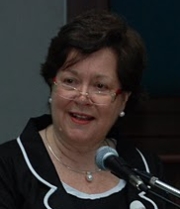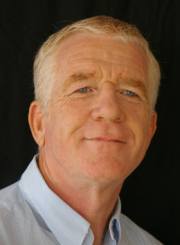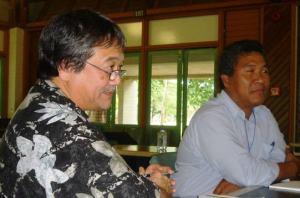
APMF President
Associate Professor Dale Bagshaw
The Asia Pacific Mediation Form (APMF) is a not-for-profit regional association of individuals, organisations and institutions interested in promoting peace through mediation and other conflict transformation processes wherever conflicts threaten the well-being of individuals, organisations, communities, and local, state or national governments in the region.

APMF Treasurer
Tony O’Gorman
The main objective of the APMF is to facilitate the exchange and development of knowledge, values and skills of mediation and other conflict transformation processes, in any form, including inter-cultural, interpersonal, inter-institutional and international, within and between the diverse countries and cultures in the Asia-Pacific region. To fulfil this objective, conferences/summits are held in the region every two years, with a different country taking responsibility for hosting each conference.
The APMF enhances the exchange of information related to mediation and conflict transformation on this website, at bi-annual regional conferences/summits, and in other on-line and face-to-face activities between members in between conferences. The Asia Pacific Mediation Forum website is dedicated to enhancing national, regional and international cooperation, collaboration and networking through the provision of a wide range of information, resources and opportunities in the areas of conflict transformation, dispute resolution and peace building.
This website also provides organisations that are members of the Asia-Pacific Mediation Forum with an opportunity to register their organisation on a database of organisations that offer mediation and other dispute resolution services, including education and training.
APMF Vice President Justice Ambeng Kandakasi
APMF Secretary Dato Hui Tan
8th ASIA PACIFIC MEDIATION FORUM (APMF) CONFERENCE
The Future of Mediation in the Asia Pacific Region was held
Da Nang, Vietnam 11th-13th November 2017
Future APMF Conferences

The APMF Steering Committee invites expressions of interest from APMF members from countries who are interested in hosting APMF Conference or Leadership Summit . If you and a group in your country are interested in hosting a Conference or another Leadership Summit please contact the President, Dale Bagshaw: dale.bagshaw@unisa.edu.au
Hosting a conference can be rewarding in many ways, including by bringing new knowledge, training and ideas to your part of the region. The APMF Executive Committee will assist with information, advice and by promoting your conference internationally.
the APMF website
We invite you and your interested colleagues to contribute to the development of our Asia-Pacific Mediation Forum website by forwarding information about events in your country, resource information and by registering your organisation in our Directory. Among other things, the APMF website includes photographs and papers from the conferences held to date.
 The Asia Pacific Mediation Forum Peace Prize
The Asia Pacific Mediation Forum Peace Prize
An APMF Peace Prize of a certificate, trophy and a small amount of money has been awarded bi-annually at most of our conferences in the Asia Pacific region (see examples below).
How to make a nomination
if you wish to nominate someone for the 2016 APMF Peace Prize, please forward the following information about an individual, group or organisation in the Asia Pacific region who you consider to be worthy of consideration to the APMF President – dale.bagshaw@unisa.edu.au – by January 15th, 2016. The nominee need not be a member of the APMF. The APMF Executive Committee will select the winner and the prize will be awarded at the 7th APMF Summit in Lombok, 10-12 February 2016 (http://www.apmf-jakarta.com/).
When making a nomination, please include:
- Name and contact details of the person(s) making the nomination (address, email, phone, fax)
- Name of the Individual, Group or Organisation being nominated and contact details – address, country, website, phone, fax and email
- If an individual is being nominated – a short Curriculum Vitae and a link to any of his/her websites, homepages etc
- If a group or organisation in being nominated – a brief description of who they are and a link to any websites, homepages.
- A brief history of the relevant peace activities of the nominee(s) in the Asia Pacific region (within a time frame)
- A clear, succinct statement as to why the nominee is worthy of a Peace Prize
- Two accompanying letters of recommendation or references.
2019 APMF Peace Prize: Awarded to Yang Jo-hoon and Moon Hyung, Peacemakers in the Jeju 4.3 Uprising, Korea.
Jeju is a beautiful and peaceful island, and as some of you know a UNESCO Heritage site. Jeju island calls itself a land of the “Three Nots,”: there are no thieves, no beggars, and no gates. Jeju residents have lived in a simple, friendly and cooperative way as farmers, fishermen and diving women for centuries.
But an ill wind, blew to the Island in 1948 at the end of World War II. The wind came due to the division of the Korea peninsular and the start of the cold war. This ill wind led to the sacrifice of 30,000 people on the island-, a tenth of the population of Jeju at that time. How did this happen? When Japan was defeated at the end of World War II it ended 35 years of bitter Japanese Colonialism in Korea and gave Korea its independence. But like Germany, Korea was divided for post-war administration by Soviet Russia and the U.S.
As the Allied Forces prepared to return Korea to its people, two conflicting groups emerged. Some Koreans supported the election of a government by Koreans living in the south only and the others supported a national election for the whole country which had just been liberated from Japanese. Jeju residents belonged to the latter group. But Rhee Syngman, backed by the U.S. Military, was afraid he might not be elected if the presidential election were country wide, so he pushed to restrict it only to the area south of the 38th parallel which is the half that the US controlled. When the Jeju citizens protested and refused to take part in the southern election, they were labeled communist and mercilessly suppressed by the South Korean armed forces and U.S. armed anti-communist militia from the mainland. The result was a fearful massacre resulting in over 30,000 deaths- mainly Jeju civilians. Any news about these events or the Korean Government’s role in it were suppressed by the Rhee Government and subsequent military governments for over 40 years. Although this tragedy affected every family on Jeju Island, Koreans who didn’t live on Jeju were kept totally in the dark. News outlets, media, schoolbooks were not allowed to mention it until recently. But the man who had the most important role in bringing this horrific event to public light is here today to receive the APMF Peace Prize.
Since 1988, Jo-hoon Yang has devoted his life to investigating and bringing to light the actual facts of the 4.3/April 3rd events by publishing hundreds of articles and lecturing. After three decades his persistent and courageous efforts finally brought about an official apology and acknowledgement of wrongdoing from the Korean Government. On the recent 70th anniversary of “Sasam” or 4.3/April 3rd Event at the 4.3 Peace Park, President Moon Jae-In apologized to the residents of Jeju Island in front of the 15 thousand of people there. He promised reparations and actions of reconciliation for the great harm that had taken place under the eyes of the Korean government. So, we want to honor Yang Jo-hoon today for playing a leading role to resolve ideological conflicts and setting the stage to transform the tragic events of history to one of peace and reconciliation.
Our second prize award is given posthumously to Hyung-soon Moon, the chief of the Seongsanpo Police Station at that time. He is sometimes referred to as the Korean Schindler, because he courageously, rejected the order of the Martial Law Enforcement Headquarter to execute all suspected rebels on Jeju when the Korean War broke out in 1950. His brave action saved 200 innocent Jeju residents. Since he passed away with no relatives in 1966, his award is being given posthumously to his former police station.
2017 – Project RENEW (Restoring the Environment and Neutralizing the Effects of the War)
 The 2017 APMF Peace Award was awarded to Project RENEW located in Viet Nam – website: www.landmines.org.au
The 2017 APMF Peace Award was awarded to Project RENEW located in Viet Nam – website: www.landmines.org.au
Chuck Searcy (International Advisor), and Nguyen Hieu Trung (Project Coordinator) received the award and spoke about the project. Project RENEW was initiated by Chuck Searcy, who had fought in the American/Viet Nam war. It was launched in 2001 and is supported by government and international non-government organisations to address the post-war consequences. It is the only comprehensive mine action model in Vietnam that integrates all activities under one single management umbrella. The project leverages existing local resources and focuses on building local capacity, skills and resources to reduce threats due to unexploded ordnace (UXO) accidents.
Between 2001-2017 – 62,752 cluster bombs, landmines and other munitions have been safely removed and destroyed; 346,544 children and adults have been taught how to keep themselves and their families safe through risk education; 300,000 pairs of TOMS shoes have been given to children; 700 families with disabilities are now earning an income from raising cows, growing mushrooms and making incense; 1,800 amputees have been provided with new artificial limbs and assistive devices; and 2,300 local health workers have been trained in life saving skills and treatment of injuries.
 To quote Chuck Searcy – “Our continuing quest is to make Quang Tri Province safe. If we can get it right in Quang Tri, the “model” developed by Project RENEW can be easily duplicated and adapted all over Viet Nam, at reasonable cost. The effort is paying off. From around 80 to 100 accidents yearly, on average from 1975 to 2001 when we started Project RENEW, in Quang Tri Province last year, 2016, there was one accident, with one fatality. This year, so far, there has been one accident — and miraculously, and thankfully, the man who detonated a munition in his workshop suffered only minor injuries and was released from the hospital the same day. We hope to continue that record. The goal is zero accidents — and we’re almost there”.
To quote Chuck Searcy – “Our continuing quest is to make Quang Tri Province safe. If we can get it right in Quang Tri, the “model” developed by Project RENEW can be easily duplicated and adapted all over Viet Nam, at reasonable cost. The effort is paying off. From around 80 to 100 accidents yearly, on average from 1975 to 2001 when we started Project RENEW, in Quang Tri Province last year, 2016, there was one accident, with one fatality. This year, so far, there has been one accident — and miraculously, and thankfully, the man who detonated a munition in his workshop suffered only minor injuries and was released from the hospital the same day. We hope to continue that record. The goal is zero accidents — and we’re almost there”.
Thank you to Cherilyn Tan, Chief Executive Officer of the Asia Law Network – who donated a significant amount of money toward the Peace Prize this year. Thank you also to Jan Sunoo who nominated Project RENEW and spoke about the Project.
APMF Peace Prize winner 2016: HJ. D.S. Dewi, S.H., M.H., Indonesia
In Indonesia, we decided to award the prize to someone who we wanted to encourage to continue their work.
Judge Dewi was selected because since 2004 she has been actively promoting court-annexed mediation in many different contexts in Indonesia:
- In the courts where she is successfully providing mediation for a range of civil cases and criminal cases (including cases involving children and domestic violence cases) and mediation training to others
- As a guest lecturer in Universities and in various Ministries
Judge Dewi has studied mediation in other countries including Japan, France, the Netherlands and Singapore and has attended international mediation conferences in Malaysia and Bangkok. In addition to promoting mediation, she actively champions the rights of women and the protection of children in the Indonesia’s juvenile courts.
Dr José Manuel Ramos-Horta was awarded the inaugural APMF peace prize in 2001 for his peace-work in East Timor.

José Manuel Ramos-Horta
José Manuel Ramos-Horta GCL is the United Nations’ special Representative and Head of the United Nations Integrated Peacebuilding Office in Guinea-Bissau (UNIOGBIS). He was appointed to this position on 2 January 2012. Previously, he was special envoy to fellow Lusophone country, Guinea-Bissau, and was the President of East Timor from 20 May 2007 to 20 May 2012, the second since independence from Indonesia. He is a co-recipient of the 1996 Nobel Peace Prize and a former prime minister, having served from 2006 until his inauguration as president after winning the 2007 East Timorese presidential election. As a founder and former member of the Revolutionary Front for an Independent East Timor (FRETILIN), Ramos-Horta served as the exiled spokesman for the East Timorese resistance during the years of the Indonesian occupation of East Timor (1975 to 1999). While he has continued to work with FRETILIN, Ramos-Horta resigned from the party in 1988, becoming an independent politician. After East Timor achieved independence in 2002, Ramos-Horta was appointed as the country’s first foreign minister. He served in this position until his resignation on 25 June 2006, amidst political turmoil. On 26 June, following the resignation of prime minister Mari Alkatiri, Ramos-Horta was appointed acting prime minister by then president, Xanana Gusmão. Two weeks later, on 10 July 2006, he was officially sworn in as the second prime minister of East Timor. On 11 February 2008, Ramos-Horta was injured when he was shot during an assassination attempt.
2. The PEACE Foundation Melanesia was awarded the Peace Prize in 2003. It is an NGO in Papua New Guinea that provides mediation and restorative justice training to local communities and groups in conflict. Br. Pat Howley is the executive director.
3. Dame Joan Metge, DBE a widely respected social anthropologist from New Zealand, was awarded the Peace Prize in 2006.
Dame Alice Joan Metge, DBE is a social anthropologist, educator, lecturer and writer. She was educated at the University of Aukland and the London School of Economics where she earned her Ph.D in 1958. Metge is a past winner of the Royal Society of New Zealand’s Te Rangi Hiroa Medal for her research in the social sciences. She was appointed a Dame Commander of the Order of the British Empire in 1987 for services to anthropology. She continues to advance peace initiatives via her work as a member of the Waitangi National Trust Board, a conference presenter, adviser, and as a mentor to mediators and conflict management practitioners. A scholar on Māori topics, she has been recognised for promoting cross-cultural awareness and has published a number of books and articles in her career. She has likened the relationship among the people of New Zealand to “a rope [of] many strands which when woven or working together create a strong nation” (as paraphrased by Silvia Cartwright).

Sister Guilermina Marcal the 2011 Peace Prize Winner
4. Sister Guilhermina Marcal, FdCC was awarded the Peace Prize in 2011 for her work in East Timor.
Guilhermina Marçal is a Roman Catholic Canossian sister. She was born in Same (East Timor) and has been working for the promotion of social, economic and cultural rights in that country.The Catholic Church in East Timor has been at the heart of the humanitarian operations in the wake of the country’s political crises and ethnic violence. Sister Guilhermina’s story of bravery and outstanding service to the people is one of many. When people fled violence, looting and arson attacks between April and June 2006, they sought shelter in a convent run by the Canossian Sisters. More than 8,000 people were formally registered at the site, but convent head Sister Guilhermina Marcal said the number swelled to up to 13,000 at night. She and other convent nuns ran the camp by themselves for the first four months. Sister Guilhermina said the convent camp had problems with malaria, dengue fever, and diarrhea. She also said 1 in 7 of the IDP’s in her camp had HIV or AIDS. She was appointed in 2010 to the Commission for the Timorese National Police (PNTL) Promotion by the East Timor State Secretary for the Council of Ministers.


